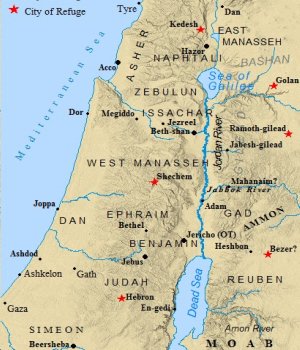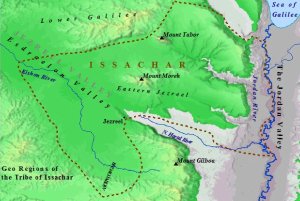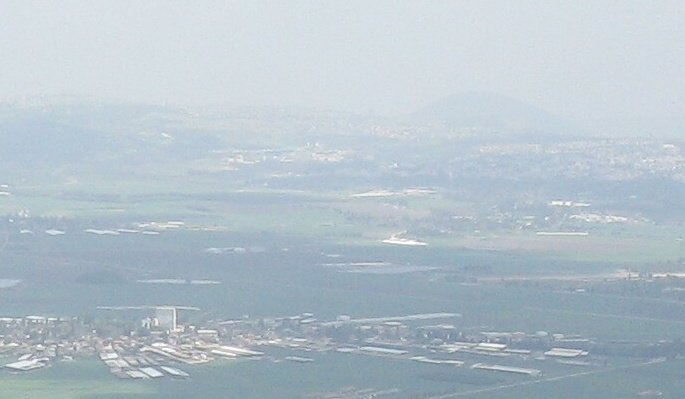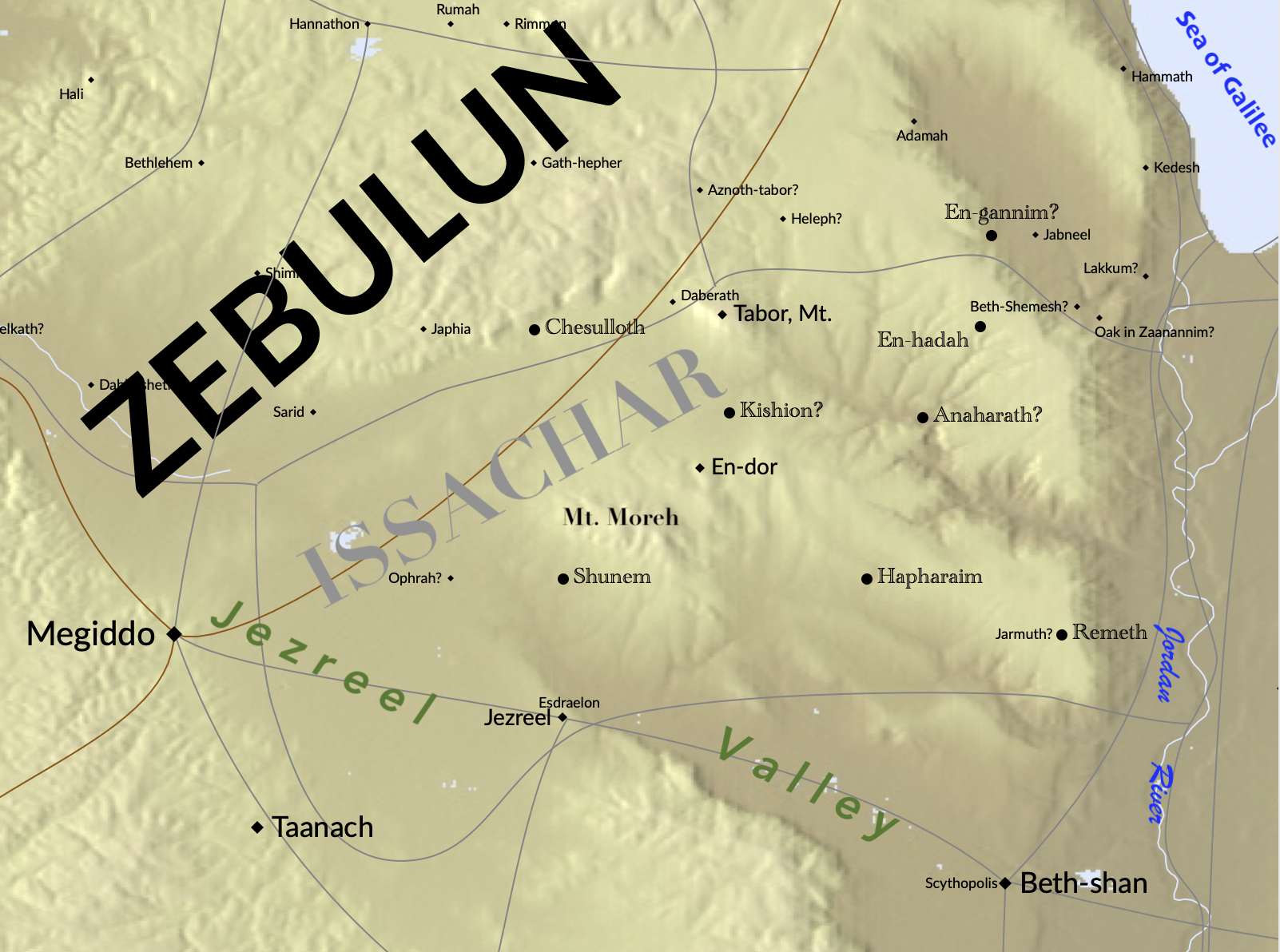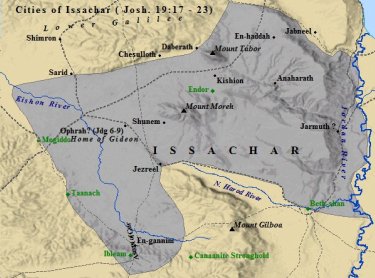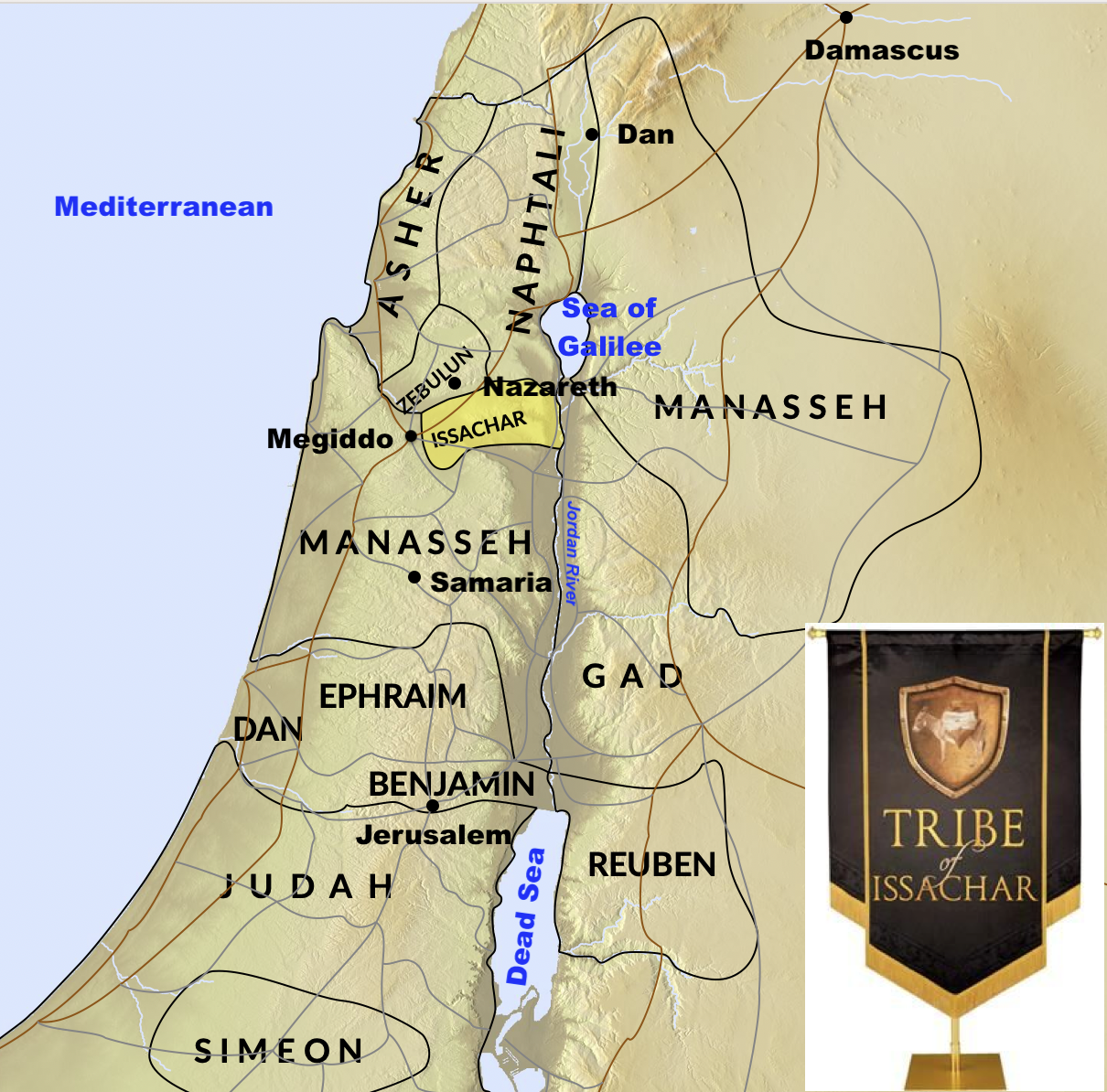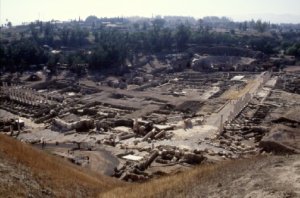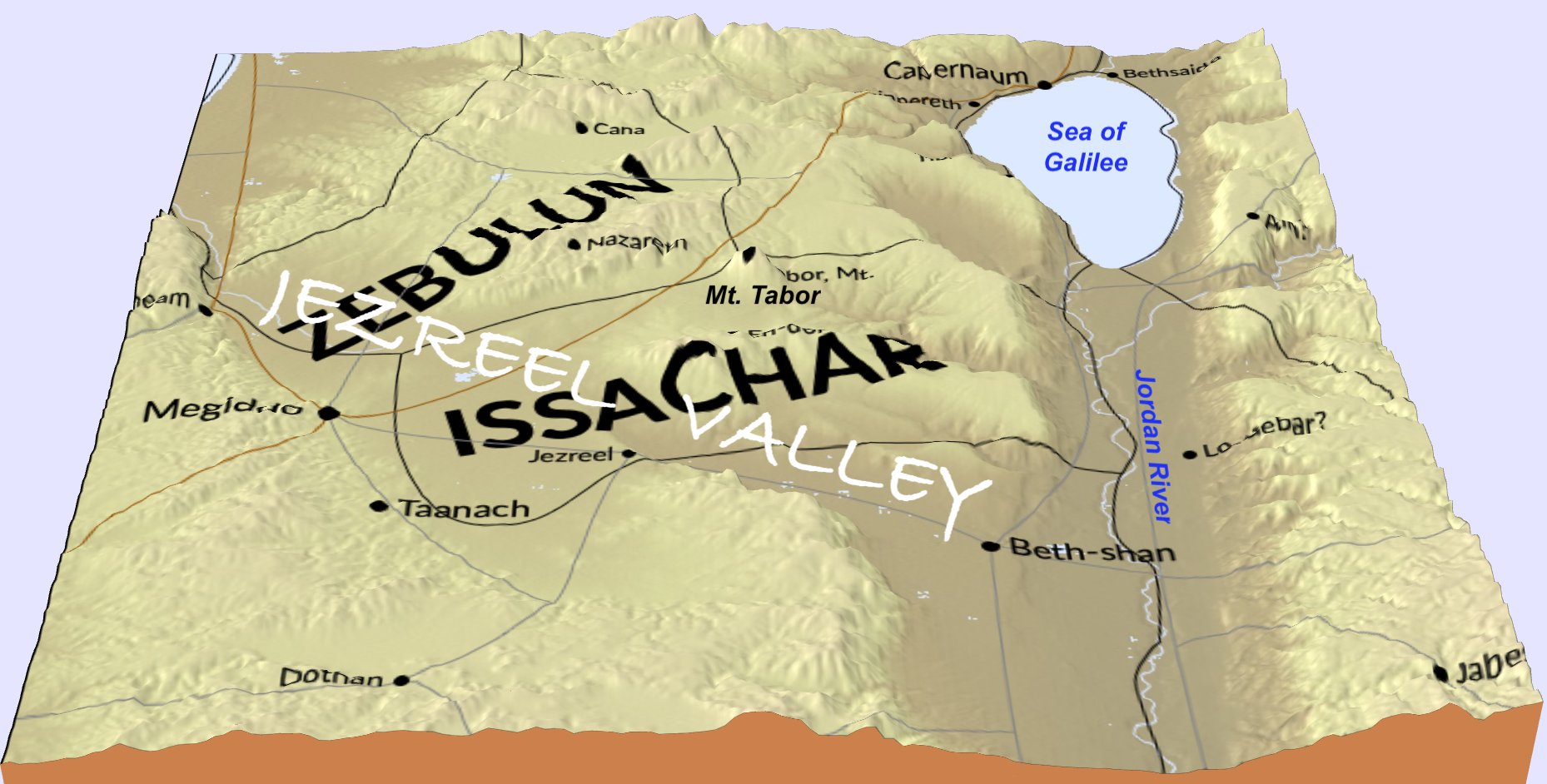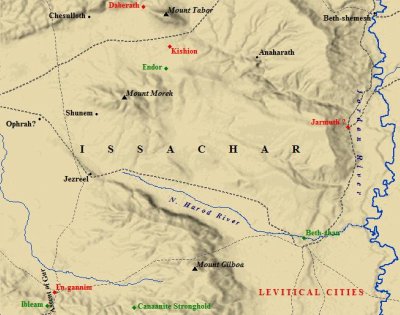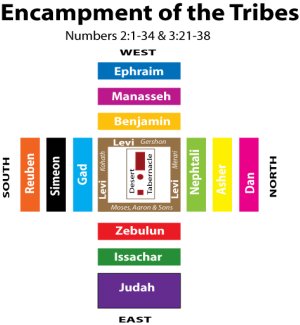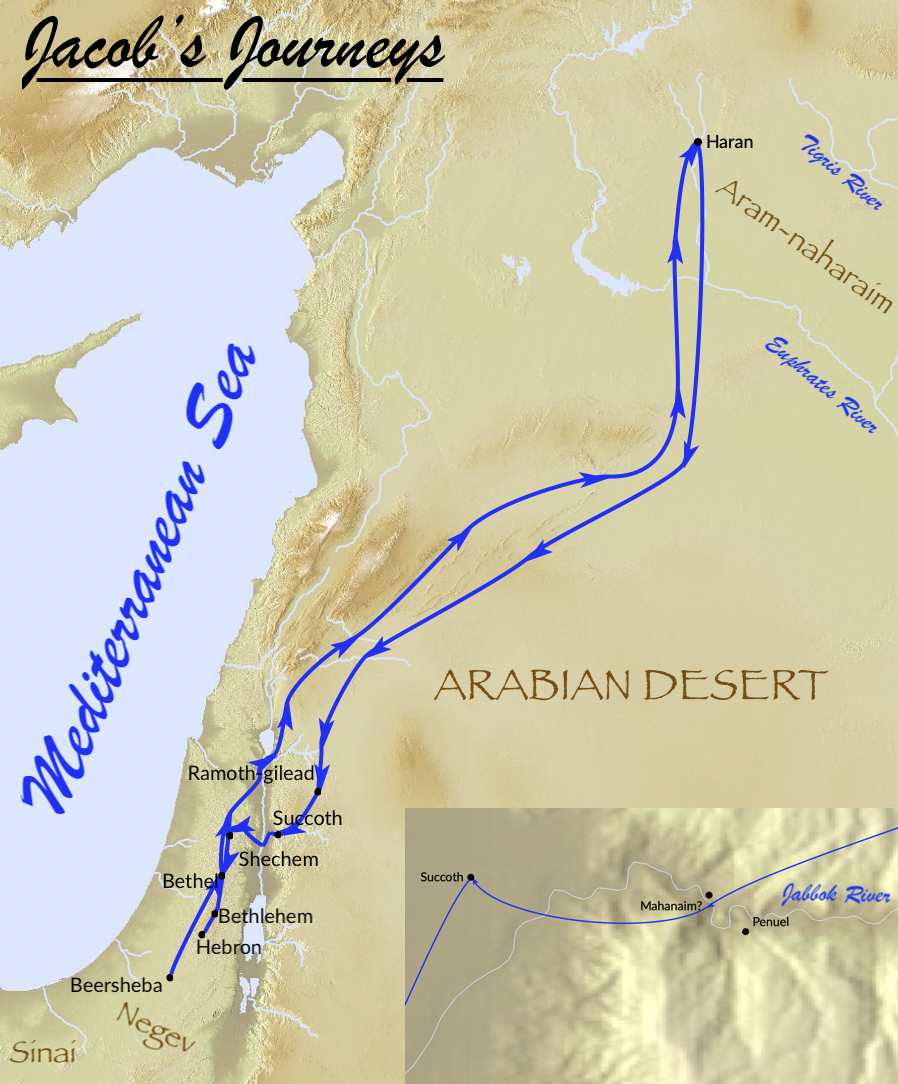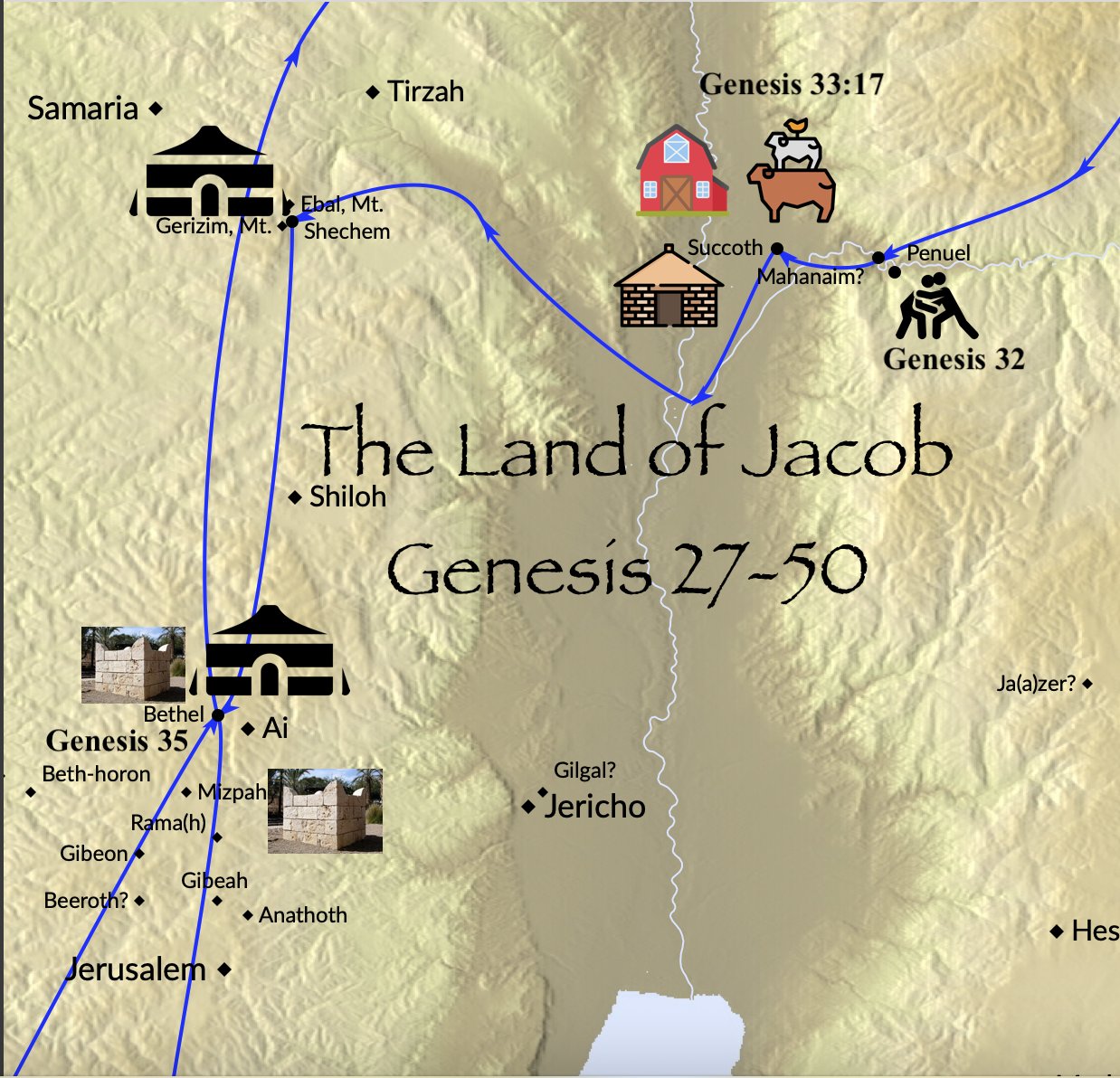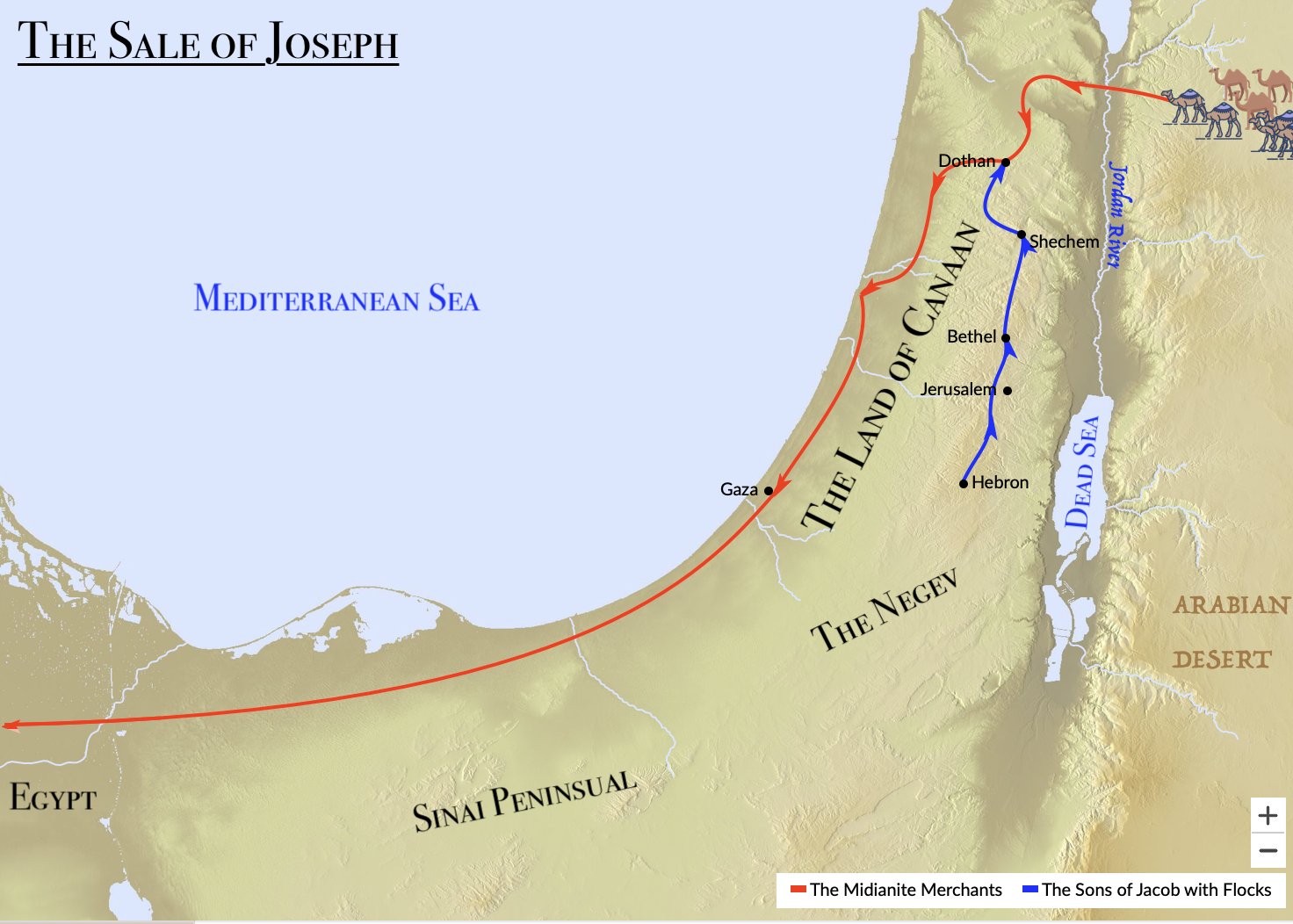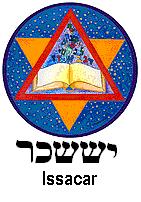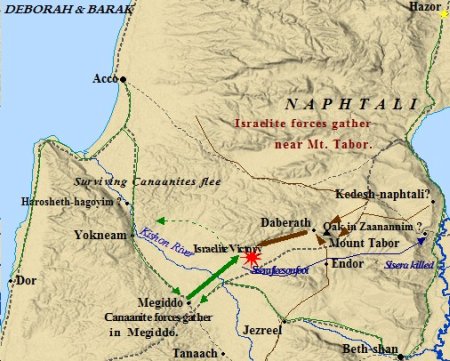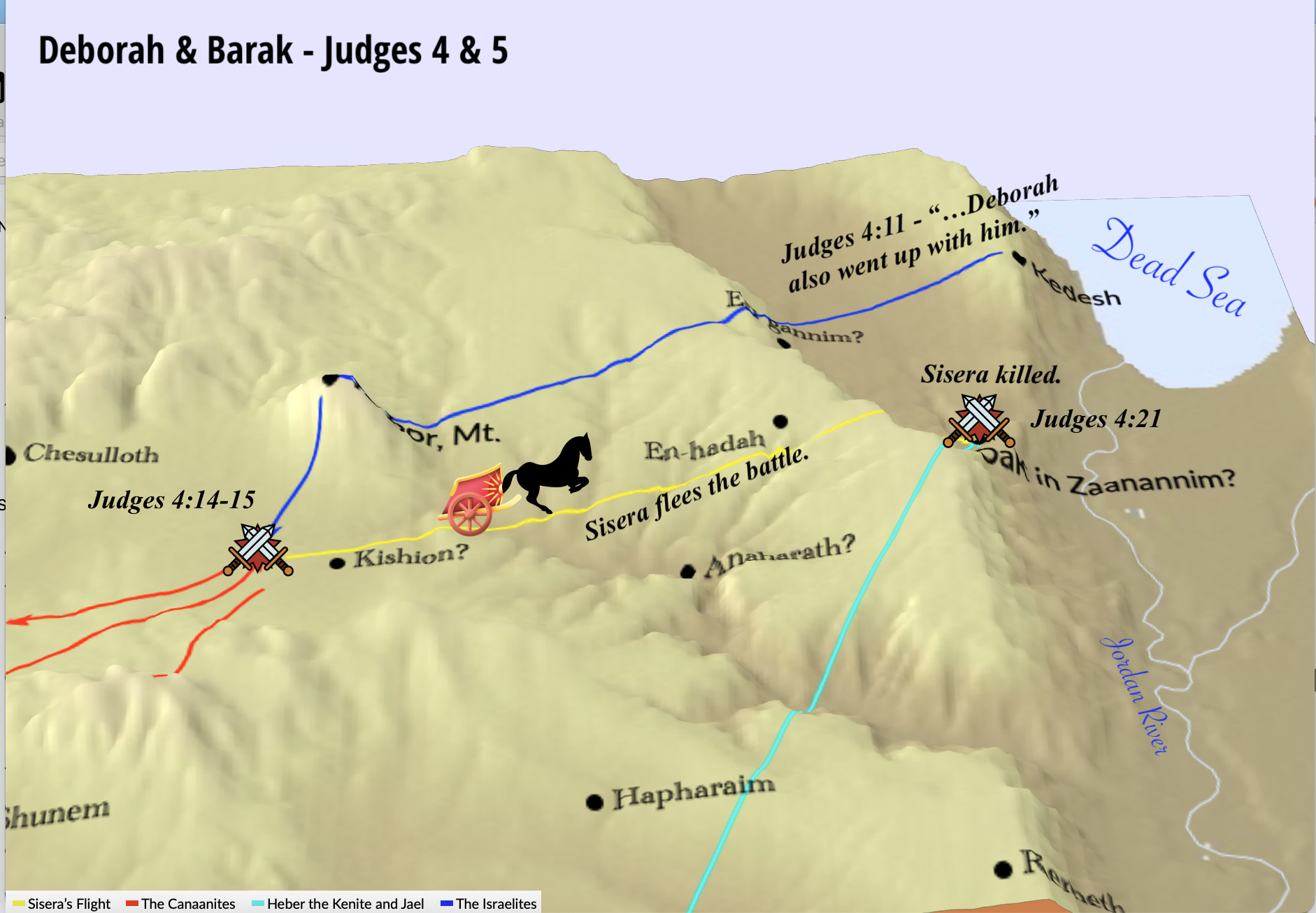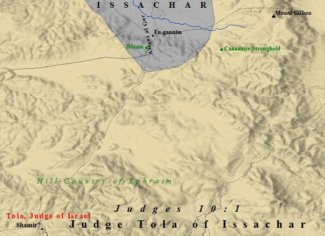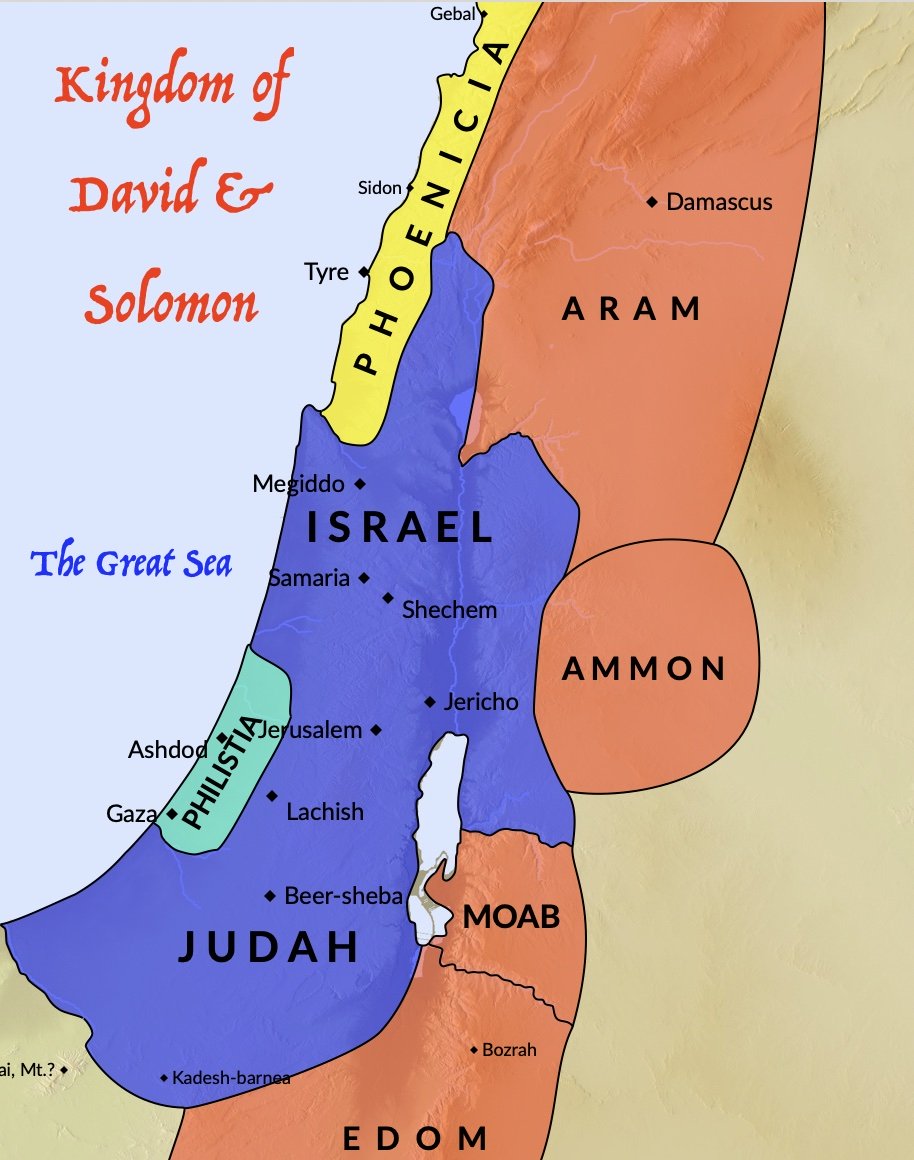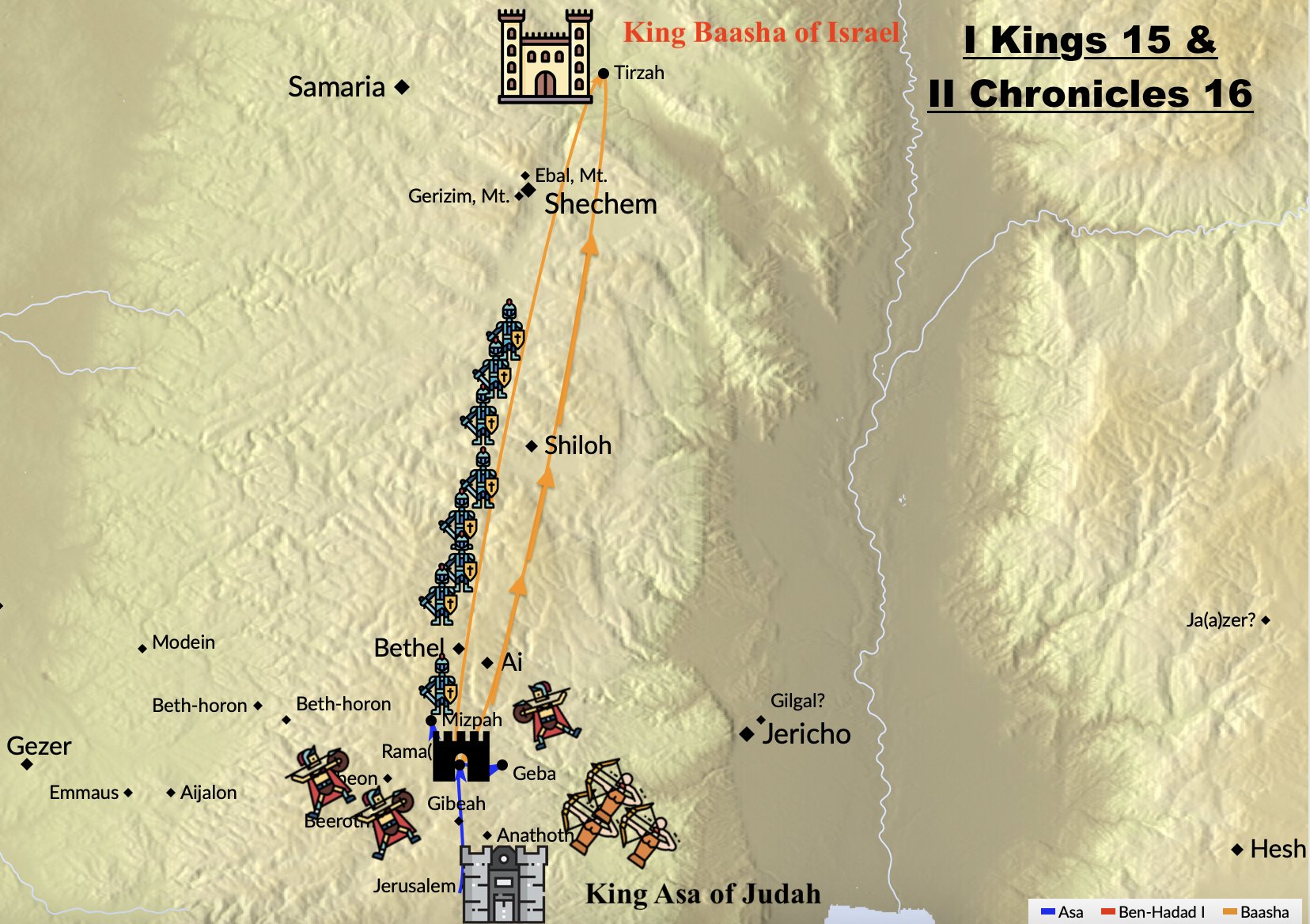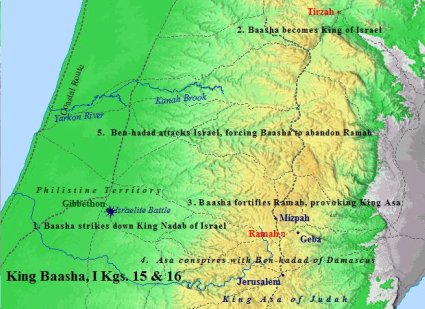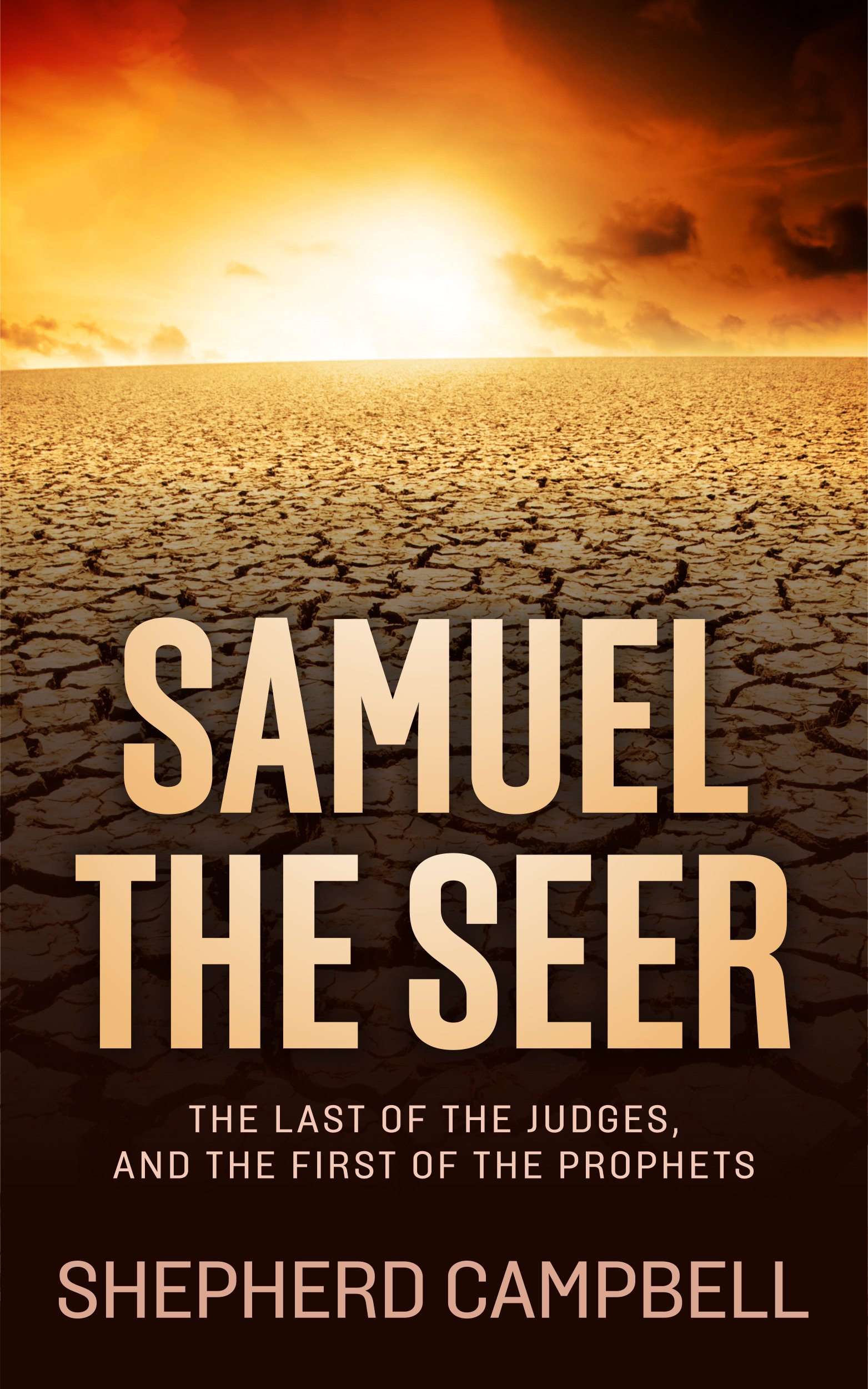- Home Page
- 12 Tribes of Israel
- Abraham
- Ancient Israel
- Ancient Mesopotamia
- Biblical Maps
- History of Israel Blog
- In the Days of Noah
- Jerusalem
- Map of Palestine
- Palestine
- The Book of Isaiah
- The City of Jericho
- The Habiru
- The History of the Old Testament
- Contact Us
- Bible Study Forums
- Media Page
- Visitors Sitemap
- Privacy Policy
VISIT OUR FACEBOOK PAGE!
The Tribe of Issachar
Jacob's Blessing of Issachar - Genesis 49:14-15
"Issachar is a strong donkey, Lying down between the sheepfolds. When he saw that a resting place was good And that the land was pleasant, He bowed his shoulder to bear burdens, And became a slave at forced labor."
Moses' Blessing - Deuteronomy 33:18b-19
"...in your tents. They shall call peoples to the mountain; There they shall offer righteous sacrifices; For they shall draw out the abundance of the seas, And the hidden treasures of the sand."
LAND ALLOTMENT
This tribe received the fourth allotment of land from Joshua, following those of Benjamin, Simeon, and Zebulun. This was the third of the three Israelite land divisions.
The first took place after the defeat of the Kings Og and Sihon, in the Transjordan. The Transjordanian tribes of Gad, Reuben, and East Manasseh were the recipients of this distribution.
|
THE LAND OF ISSACHAR WAS SANDWICHED BETWEEN THE TRIBES OF WEST MANASSEH AND ZEBULUN. IT WAS LOCATED PRIMARILY IN THE JEZREEL VALLEY. |
The second division took place after the successful campaign in southern Canaan by Joshua and the Israelite tribes, initiated by the victory at Jericho. This division accommodated for Judah, Ephraim, and West Manasseh. The third and final division occurred after the Northern campaign's victory at the Waters of Merom; in which the tribes of Naphtali, Zebulun, Asher, and Issachar were assigned land portions. Interestingly, the southern tribes of Benjamin, Simeon, and Dan had been left out of the second division, which took place at Shiloh. Thus, they were assigned borders along with their northern counterparts in this third division. |
The northern boundary was bordered by the tribes of Zebulun and Naphtali. The land included the basaltic slopes of the eastern portion of Lower Galilee. These were rugged slopes, characterized by difficult terrain and a lack of water sources. These factors hindered settlement in the region.
ISSACHAR PAGE CONTENTS
Click on a link to jump to that section of this page.
Map of Geo-regions of Issachar
Tribal Encampment in the Wilderness
The Tribe and Hezekiah|
In the northeast, the boundaries touched those of Zebulun, and extended westward to the Kishon River. The southern boundary bordered the northern boundary of West Manasseh. Thus, an eastern portion of the Jezreel Valley, along with the city of Megiddo, rested within their tribal allotment. The sons of Issachar looked east through the Jezreel Valley and the Plain of Esdraelon. The Jordan River formed the tribe's eastern boundary. Though the plain was indeed fertile, well watered, and ideal for agriculture, Issachar enjoyed little success in occupying the land. |
ISSACHAR OCCUPIED THE JEZREEL VALLEY, AND PARTS OF LOWER GALILEE. MOUNT MOREH WAS THE SITE OF MANY BIBLICAL BATTLES. THE JEZREEL IS THE SITE OF THE FUTURE BATTLE OF ARMAGEDDON. |
Their allotment was one of the most agriculturally desirable. However, it was also one of the most precarious.
The Jezreel Valley was ideal for an agricultural people. It possessed fertile, flat plains which were well suited for cattle.
Canaanite strongholds throughout the area prevented Issachar from gaining primary control of the Valley. The ancient city of Megiddo, one of five Canaanite strongholds in the region, rested within the tribal boundaries of Issachar.
Megiddo has been a site of bloodshed for thousands of years, and was vital in controlling the Jezreel Valley. Megiddo is also the site of the future Battle of Armageddon, spoken of in the book of Revelation by John.
Mount Moreh is located in the Jezreel Valley. It stands almost in the center of the tribe's allotment as looked at on a map.
The tribe's prime location was also a contributor to it's eventual downfall. The land was interconnected by a series of oriental highways and road systems, indicated by dotted lines on the city map.
It was upon these roads the ancient armies of foreign invaders marched, and oftentimes converged for battle. The vulnerability of the tribe to these armies made it difficult to maintain law and order.
It would not be until the time of David and Solomon that Israel would exert a majority control of the area. Solomon is said to have strengthened the city of Megiddo by building up its gates.
Many scholars argue the border description in the Bible is rather brief, vague, or abbreviated. The most detailed description is given in Joshua 19:17-23.
"The fourth lot fell to Issachar, to the sons of Issachar according to their families. And their territory was to Jezreel and included Chesulloth and Shunem, and Hapharaim and Shion and Ana-Ebez, and Remeth and En-gannim and En-haddah and Beth-pazzez. And the border reached to Tabor and Shahazumah and Beth-shemesh, and their border ended at the Jordan; sixteen cities with their villages. This was the inheritance of the tribe of the sons of Issachar according to their families, the cities with their villages."
Joshua 17 records an interesting exchange between the the tribe of the ninth son of Jacob, Asher and Manasseh. It would seem, based on the Biblical text, certain cities were handed over to the tribe of Manasseh from the other two tribes.
In the case of Issachar, these cities were cities which the Canaanites were not driven from. Verse 11 lists these cities as Beth-shean, Ibleam, Dor, En-dor, Taanach, and Megiddo.
These cities were the Canaanite strongholds previously mentioned. They bordered and surrounded much of the Jezreel Valley, preventing Israel from possessing the land entirely.
Each city lie within the Biblical boundaries of Issachar. Perhaps the Israelites thought the tribe of Manasseh would be able to drive the Canaanites from their strongholds. However, the Bible clearly states, in verse 12, that "the sons of Manasseh could not take possession of these cities".
The Canaanites held out, and these strongholds remained threats to the Israelites until the time of David and Solomon.
Ophrah, the home of Gideon, is believed to have existed in the Jezreel Valley, west of Mt. Moreh. Endor was located just north of Moreh. This is where King Saul sought a spirit medium to access the ghost of Samuel.
North of Endor stood Mt. Tabor. It was down the slopes of Mt. Tabor that Barak charged the Canaanite King Jabin at Deborah's command, slaying him and his men in route of an Israelite victory. Israel's great victory that day is celebrated by the Song of Deborah found in Judges 5.
The ancient city of En-gannim was located in the south, with Jezreel north, resting along roadways and trade routes. Mount Moreh stood to the north of these cities, in the center of the valley.
To the southeast was the ancient city of Beth-shan, a very important city of antiquity as it sat along several intersections.
It was through the Esdraelon Plain, noted above, that the many caravans passed through the interior of Issachar. These roadways connected the Levant to the foreign empires to the south, north, and east.
In Biblical times, the Jezreel Valley was regarded as separate area from the Plain of Esdraelon. The vale of Jezreel is a narrow strip of fertile land sandwiched between the hills of Lower Galilee to the north, and the Gilboa range on the south. Its total length is approximately fifteen miles.
The principal city of this area is Beth-shan. Beth-shan is four miles from the Jordan River. It is 430 feet below the Mediterranean, and 300 feet above the Jordan River. The vale of Jezreel plummets at an astonishing 50 feet per mile! Beth-shan was a Canaanite stronghold throughout the early stages of Israelite history. Their control over the area prevented Israel from full settlement.
|
During the conflict with Deborah and Barak, Canaanite armies passed through Beth-shan enroute to Megiddo, the staging area. From Megiddo, the Canaanite forces engaged the Israelites. Many of these same Canaanite soldiers fled the way they came afterward. Crossing the Jordan from the mountains of Gilead in the east, Beth-shan would be one of the first cities encountered. The city also played a key figure in the death of one of Israel's great kings. It was in Beth-shan where Saul's dead body was hung on the walls of that powerful Canaanite city, until rescued by men from Jabesh-gilead. |
THE RUINS OF BETH-SHAN. THIS WAS THE PRIMARY CITY WITHIN THE VALE OF JEZREEL, LOCATED 4 MILES WEST OF THE JORDAN RIVER. BETHSHAN WOULD BE THE FIRST CITY ENCOUNTERED IF CROSSING THE JORDAN FROM GILEAD IN THE EAST. |
The Jezreel valley is watered by the Jalud stream, which has its source in Harod, east of Jezreel. It is here a spring bursts forth from the side of Mt. Gilboa.
Many feel this is the spot where Gideon defeated the Midianites, who were encamped on the other side of the valley. Ahab's old capital, Jezreel, is also an important city in the region. It was at Mt. Gilboa Saul and Jonathan were defeated by the Philistines, with Saul's body being taken to the above mentioned Beth-shan and hung from the city walls.
The Jezreel Valley has participated in much of Israel's glorious past. It lay at the center of many of Israel's most significant engagements and military encounters.
The territory of this tribe was a hotly contested region, therefore possesses some of the countries most heroic history. Strangely enough, however, the tribe descended from the ninth son of Jacob would come to be known for it's mind, not might.
LEVITICAL CITIES
The tribe of Levi became known as the Priestly tribe. They were set apart for God, and ordained by God to not receive a portion of the inheritance. They were the portion reserved for God.
Consequently, God gave them cities from each of the other twelve tribes to dwell and live in. Each city also contained all of the pasturelands associated with that city.
Cities from the tribe were given to the Gershonite clan of the Levites. The Gershonites were descended from Gerson, one of the sons of Levi. These four cities are found in Joshua 21:28-29.
"And from the tribe of Issachar, they gave Kishion with its pasture lands, Daberath with its pasture lands, Jarmuth with its pasture lands, En-gannim with its pasture lands; four cities"
These cities were located throughout all of their land. En-gannim was in the extreme southeast. Interestingly, En-gannim was neighbors with the Canaanite stronghold of Ibleam.
Jarmuth was in the eastern part of the tribal allotment. In the north were the two cities of Kishion and Daberath. The Gersonites received thirteen cities in all, four from this tribe.
THE TRIBE OF ISSACHAR ENCAMPMENT
The Biblical text leaves little question as to the detail God took with His people. Though they left Egypt in haste, God quickly organized them into a cohesive unit. Times were certainly not easy for Moses, especially early.
However, by listening to God, and obeying His instructions, the Israelites evolved into one functioning body. Part of their discipline was in the way they set and pitch camp around the Tabernacle.
The Tabernacle was at the center of the Israelite camp. Each tribe had an assigned section in direct relation to the Tabernacle, which contained the Ark of the Covenant. God's instructions to Moses and Aaron can be found in Numbers 2:1-2.
"Now the Lord spoke to Moses and Aaron, saying, 'The sons of Israel shall camp, each by his own standard, withe the banners of their fathers households; they shall camp around the tent of meeting at a distance."
God then proceeded to instruct Moses on the exact location of each tribe. The overall camp was divided into 4 smaller camps consisting of three tribes per camp. Each camp was led by a tribe.
The four heads were Judah, Reuben, Ephraim and Dan. The instructions concerning Issachar are found in verses five and six.
"And those who camp next to him shall be the tribe of Issachar, and the leader of the sons of Issachar: Nethanel the son of Zuar, and his army, even their numbered men, 54,400."
The sons of Issachar fell under the banner of Judah, the first tribe mentioned by God to Moses and Aaron. The camp of Judah was the first to break camp. They encamped on the east side, "towards the sunrise".
Scripture seems to imply a certain honor with this position. Moses and Aaron camp on the east side of the tent of meeting as well, though inside the Tabernacle compound. The entrance to the Tent faced east, "towards the sunrise".
The tribe's camp fell in-between Judah and Zebulun. All together, the camp of Judah included 186,400 men, according to Numbers 2:9. This favored position of Judah's would later manifest itself in the dynasty established by King David, Israel's greatest King.
Interestingly, Scripture relates an incident in which the leaders of the tribe switched their allegiance from Saul to David. Many Biblical scholars view this incident as evidence of the tribe's political astuteness and wisdom.
Perhaps the leaders remembered such ties. Regardless, Scripture clearly indicates the two tribes cooperated throughout the Old Testament.
THE NAME & BIRTH OF ISSACHAR
Issachar was the ninth son of Jacob, and the fifth given him by his wife Leah. If one recalls the Jacob narrative, it was Rachel he originally loved and wanted to marry. It was only through Laban's deception that Jacob married Leah.
Leah, however, would be the wife which would bear him the most children. The birth is recorded in Genesis 30:17-18.
"And God gave heed to Leah, and she conceived and bore Jacob a fifth son. Then Leah said, 'God has given me my wages, because I gave my maid to my husband.' So she named him Issachar."
His birth followed a remarkable deal struck between the two sister-wives Rachel and Leah. This deal involved Reuben, and some mandrakes he had obtained from the fields.
In Genesis 30:14-17, Reuben is said to have come in from the fields during the wheat harvest. He had with him some mandrakes, and gave them to his mother, Leah.
Mandrakes are an interesting fruit. The mandrake was a small, orange colored fruit. In ancient times it was thought of as an aphrodisiac, and a promoter of fertility. Its large roots have also been used as a narcotic.
In this view, it is easy to understand why Rachel, at this time in the narrative the barren wife of Jacob, would seek to obtain the fruit thought to promote fertility.
Rachel asked Leah for some of the fruit her son had brought in. Leah refused. Rachel, thus, offered Jacob's services to Leah for that particular night, in exchange for the fruit. Leah agreed, and that night resulted in the birth of Jacob's ninth son.
The exact origin and nature of this name is of some debate. One theory interprets the name as "yesh sakar". The Hebrew word translated as such means, "there is a reward". Biblical scholars and proponents of this interpretation point out this corresponds to Leah's statement upon his birth.
The word translated as "wages" above is, in some translations, rendered "reward". The name, thus, is an allusion to God's reward to Leah for sharing her maiden with Jacob when she, herself, was bare.
Another theory interprets the Hebrew as "ish sakar". This translates as "man of hire". Proponents of this translation point to verse sixteen of the narrative. This verse immediately follows Rachel and Leah's transaction, and is the first encounter between Leah and Jacob.
"When Jacob came in from the field in the evening, then
Leah said, 'You must come in to me, for I have surely hired you with my
son's mandrakes.' So he lay with her that night."
The meaning of the name, hence, is an allusion to Leah hiring Jacob's sexual favors from Rachel for some mandrakes.
Some scholars, such as Yadin Yigael and N.K. Sandars, argue that the tribe actually derived from a group of the Sea Peoples known as the Shekelesh.
In Hebrew this may be rendered, "men of the shekel". This term is synonymous with "ish sakar", "man of hire". The Sea Peoples were an interesting group of people.
Little is known of their origins, and little is agreed upon. What is agreed upon is they probably originated in the Mediterranean, and migrated eastward to Egypt and the Levant. They are argued by some scholars to have attempted to attack Egypt, failed, and concentrated their efforts on Canaan.
The Philistines, one of Israel's most notorious enemies, are believed by many scholars to have been a part of the Sea Peoples, and settled on the coast sometime after the failed attack of Egypt. Volumes have been dedicated to the study of the Sea Peoples, and they remain wrapped in mystery.
Interestingly enough, names akin to Asher and Issachar were discovered in an eighteenth-century Egyptian king list. The name Job also occurs in the same list. Biblical names occur frequently throughout a wide variety of ancient texts.
The names Gad and Dan appear in texts discovered in ancient Mari, known as the Mari Texts. The name Benjamin appears in some Mari Texts as the name of a tribe. Zebulun occurs in the Egyptian Execration Texts.
Some scholars believe the Execration Texts to contain the first ever reference to Jerusalem. These ancient Hebrew names, possessed Amorite characteristics, common amongst the population of Mesopotamia and Canaan in the second millennium. These references prove the social accuracy of the Bible's language throughout the Old Testament.
Though the exact meaning is not agreed upon, it nonetheless originated from fascinating events. The events leading up to his birth are well covered by Scripture.
However, when it comes to the man of Issachar, the Bible is relatively silent. Nothing is mentioned of him in any part of the Joseph narrative. In fact, the name is mentioned only once more in the book of Genesis.
THE NINTH SON OF JACOB
His absence from the narrative of Joseph indicates he went along with his brothers in the plot to kill, then sell Joseph into bondage.
It is interesting to note, however, that Issachar's silence in the narrative would indicate he was one of the brothers originally intent upon killing Joseph. Genesis 37:21 clearly indicates it was Reuben who swayed the majority to spare Joseph's life.
"But Reuben heard this and rescued him out of their hands and said, 'Let us not take his life.' "
Nothing else is said of the ninth son of Jacob until Genesis 46.
|
Rabbinical literature states that he was born in the month of Av, on the fourth day. Av is the fifth of the twelve Hebrew months, and is the only month not mentioned in the Bible. It is a summer month, usually concurrent with July-August. Aaron died in this month. The First and Second Temples were destroyed in this month. It is also the month of the sin of the spies who unfaithfully reported back to Moses the land could not be taken. |
Scripture does indicate that Issachar was born in Aram-naharaim, and not the land of Canaan. The only of Jacob's children to be born in Canaan was Benjamin.
Further mention can be found in the book of Jasher. In chapter 45 the story is told of how he and Levi went east to seek a bride. They took as their wives the daughters of Jobab the son of Yoktan, the son of Eber.
Jobab's oldest daughter was Adinah, and the younger Aridah. It was the younger, Aridah, that Issachar took as his bride. The couple moved back to Canaan where they had children.
The book of Jasher also contains one of the most fascinating stories about Issachar. It is important to note that the book of Jasher is a controversial book even amongst scholars.
The Jewish Encyclopedia states; "The nature of this book has been a matter of discussion from the time of the Greek Septuagint up to the present day." It was not accepted into the "official" canon of the Bible.
However, it is mentioned twice in the Old Testament.
"Is not this written in the Book of Jasher?" -- Joshua 10:13
"Behold it is written in the Book of Jasher." -- II Samuel 1:18
In chapters 38 and 39 of Jasher, the sons of Jacob are waging war on many of the Canaanite cities. They are said to have scaled city walls, each taking a corner of the city by heroic deeds similar to those of superheros.
However, Issachar and Naphtali "remained under the wall". Together they "kindled a fire" until the iron of the city gates broke, throwing open the gates of the already under attack city. The portrayal is rather anti-climatic in comparison to the feats of his other brothers. His role is certainly the least daring and heroic of the brothers.
Others have argued this is evidence of the pragmatic and intellectual superiority of Issachar. Rather than fight, they opened the city in a less dangerous way, yet through means of using the mind rather than might.
Indeed, this seems to be the portrayal of the tribe throughout various passages in the Old Testament. They were a tribe of intellects, the scholarly tribe of the 12 tribes of Israel.
The Bible mentions Jacob's ninth son by name only three times in the Old Testament. All other references refer to the tribe, or representatives from the tribe. Each of the three passages list the sons of Issachar. One is found in Genesis, the other in Numbers, and the last in I Chronicles.
Genesis 46:13
"And the sons of Issachar: Tola and Puvah and Iob and shimron."
In other verses Puvah is translated Puvvah, or Puah. Iob is also rendered as Jashub in I Chronicles 7. These sons were part of the seventy that left Canaan with Jacob and moved into Egypt.
The reference in Numbers 26:23-25 has to do with the first census taken by Moses upon the Israelites leaving Egypt. The tribe is mentioned by family, with their total numbering 64,300.
"The sons of Issachar according to their families: of Tola, the family of the Tolaites, of Puvah, the family of the Punites; of Jashub, the family of the Jashubites; of Shimron, the family of the Shimronites."
The most detailed account occurs in I Chronicles 7:1-5. This passage lists the geneaology.
"Now the sons of Issachar were four: Tola, Puah, Jashub, and Shimron. and the sons of Tola were Uzzi, Rephaiah, Jeriel, Jamai, Ibsam, and Samuel, heads of their fathers households. The sons of Tola were mighty men of valor in their generations; their number in the days of David was 22,600. "
Further attention is paid to Tola's sons in verse three. verse five relates "all the families of Issachar were mighty men of valor".
This statement seems to goes against the reputation this tribe has in today's academic opinion. Most scholars view Issachar as meek, shying away from military engagements. This was countered by their prowess in the law, however.
Perhaps this opinion is formed more by his diminished role in the book of Jasher and in other Rabbinical texts, rather than the Scriptures. Scripture makes no mention of Issachar, other than the aforementioned three.
His ancestors were called "mighty men" and "men of valor". The remaining passages deal with Issachar as a tribe of Israel. The tribe was well looked upon by the Old Testament.
THE TRIBE OF ISSACHAR
The first mention of the tribe occurs in Numbers 1:8. The tribes are gathering outside of Egypt under Moses, and he is beginning to organize the loose, probably chaotic mass of fleeing individuals.
God instructs Moses as to how he must go about organizing His people. Moses is to appoint leaders over each of the tribes of Israel.
Though the Exodus certainly included non-Jewish individuals, the exact number is not known, the Old Testament emphasizes the Jewish aspect. However, Scripture acknowledges the fact other people were with the Israelites.
Theories vary widely as to the ethnic makeup of the Exodus, and the Jewish people themselves, at this point in their history. Regardless, Moses begins by assigning leaders over those that identified themselves with one of the twelve tribes of Israel.
God's Word to Moses is given in Numbers 1:4-5.
"With you, moreover, there shall be a man of each tribe, each one head of his father's household. These then are the names of the men who shall stand with you:"
Each tribe is represented by one man. The man from the tribe of Issachar is given in verse eight.
"of Issachar, Nethanel the son of Zuar;"
The next mention takes place in Numbers 7. The tribes are presenting sacrifices to the newly completed Tabernacle. Moses had anointed it and consecrated it, and each tribe was to present an offering.
One tribe was to offer a sacrifice per day, for twelve days. Though Issachar was the ninth son of Jacob, they were the second tribe to present an offering. The offerings were made in the order of the encampment. The tribal representative presented their offering after Judah, on the second day of the ceremony.
Once again it is Nethanel leading the tribe in verse 18.
"On the second day Nethanel the son of Zuar, leader of Issachar, presented an offering."
In verse three, the 12 tribes of Israel are shown carrying their sacrifices in "six covered carts, and twelve oxen, a cart for every two of the leaders, and an ox for each one".
The Numbers Raba, a Midrash, or commentary, by ancient Jewish scholars on the book of Numbers, claims the men of Issachar advised the other tribes to bring the carts and oxen upon which to carry their sacrifices.
Numbers 10 depicts the 12 tribes of Israel as they pack up camp and leave Sinai. Verse fifteen mentions Nethanel and the tribe's army breaking camp.
The standard of Judah was the first division to break camp. Issachar is listed second, behind Judah and before Zebulun. It would seem reasonable this was the order in which the standard of Judah set out.
Nethanel, thus, led the tribe at its earliest stages. Interestingly, Nethanel was succeeded by Igal, the son of Joseph. Numbers 13:7 records Moses' appointment of Igal as the tribes spy into Canaan.
Igal is not heard of individually, however, his report surely fell into the majority report that the land was too great and its inhabitants too powerful for Israel to overcome. Their report incited the people to grumble against Moses and Aaron.
The only two spies to report back faithful were Joshua and Caleb. Igal, thus, failed to represent the tribe in a faithful manner. However, the tribe redeems itself throughout the other passages found in Scripture.
Numbers 25 tells of a plague suffered by Israel which claimed 24,000 lives. Immediately after the plague, God instructs Moses and Aaron to "Take a census of all the congregation".
This was the second census taken by Moses of the Israelites. A census may seem strange, as God surely knew the number of Israelites present, as well as every other being on earth. However, perhaps it was simply for the benefit of His people that such exercises took place.
In order for Israel to conquer Canaan, they had to operate as one unit in combat. They were united by the worship of God Almighty, thus had to learn to function together and cooperate on fundamental levels.
The practice of assembling the congregation, of camping in specific order, of breaking camp in specific order, of presenting sacrifices in specific order, drilled into their minds the idea of unity and oneness.
Though each tribe was individual in nature, and oftentimes function, God used this time in the wilderness to form a bond amongst the twelve tribes of Israel.
In verse twenty-three, the sons of Issachar are counted "according to their families".
"The sons of Issachar according to their families; of Tola, the family of Tolaites; of Puvah, the faimly of the Punites; of Jashub, the family of the Jashubites; of Shimron, the family of the Shimronites. These are the families of Issachar according to those who were numbered of them, 64,300."
The males twenty years old and upward were the only ones among the numbered of each tribe. Thus the actual number of Issachar was much larger, perhaps double. The New American Standard heads chapter 26 of Numbers as, "Census of a New Generation".
Indeed this generation of Israel would have been children, infants, and unborn when their fathers left Egypt. It was the sin of the older generation which prevented Moses from entering the Promised Land.
Thus, the tribal leaders would have been among those that led the charge into Canaan. These men were certainly extraordinary men, fighting against extraordinary foes. The Israelites, however, possessed an extraordinary God.
Numbers 34 is God's instructions for apportioning the land of Canaan amongst the Israelites. Interestingly, God instructs them on how to distribute the land before a single battle had been fought.
All the Israelites had to do was trust God Almighty, the God of Abraham, Issac and Jacob, for the war was already won. God told Moses each tribe was to be represented by one man. That man "shall apportion the land to you for inheritance".
Verse twenty-six lists the tribal representative as Paltiel, the son of Azzan.
The next mention is in Numbers 33:19. This verse is Moses's Blessing to the tribe before his death. Moses' blessing was favorable.
"...And, Issachar, in your tents. They shall call peoples to the mountain; There they shall offer righteous sacrifices; For they shall draw out the abundance of the seas, And the hidden treasures of the sand."
This "call" was not a random call. The language used indicates a specific call, for a specific purpose. The verb used indicates a specific name. The act of naming sometimes may indicate a superior position by the one naming.
In this case, the tribe would occupy the superior position, as it called the people to the mountain. The Hebrew word is also used to indicate calling upon the name of God.
Moses imagery of sacrifice on a mountain would have been very close to the heart of Israelites. The tribe seemed to have held the reputation for being a holy tribe, according to this interpretation of Moses' Blessing.
This, by no means, should be taken as a proven, wholly accurate interpretation of this passage. However, it would seem to fit with the tribe's reputation.
They were a holy tribe, a tribe of learned men, learned in the law, and in the ways of God. This was a respected tribe, one whom the others listened to intently and regarded with high esteem.
Though the book of Jasher downplays their military prowess, the next appearance in Scripture contradicts this view. Issachar played a key role in the battle against Jabin and Sisera. In fact, the battle itself was fought within the tribe's boundary.
PRINCES & PRINCESSES OF ISSACHAR
DEBRAH & BARAK - JUDGES 4-5
The tribe was central in a major battle found in Judges 4. The Israelites became oppressed by Jabin, king of Hazor. Jabin was probably a name-like title given to the king of Hazor, similar to Caesar and Pharoah.
Scripture tells us Jabin's commander was Sisera, who lived in Harosheth-hagoyim. Scripture records Jabin "oppressed the sons of Israel severely for twenty years".
This conflict took place in the Jezreel Valley. This battle takes place in the same general area as the Battle at the Waters of Merom.
The oppressing forces of king Jabin are said to have had nine hundred iron chariots in Judges 4:3. The oppression came about because, "the sons of Israel again did evil in the sight of the Lord".
God then called on a man of the tribe of Naphtali to deliver the Israelites. At this time, Deborah was Judging the Israelites from her spot "under the palm tree of Deborah between Ramah and Bethel". Her command from God was given to Barak in Judges 4:6.
"Now she sent and summoned Barak the son of Abinoam from Kedesh-naphtali, and said to him, 'Behold, the Lord, the God of Israel, has commanded, Go and march to Mount Tabor, and take with you ten thousand men from the sons of Naphtali and from the sons of Zebulun."
In chapter four the primary tribes involved are Naphtali and Zebulun. In verse 7 God assured Barak He would draw out Sisera and his army, and deliver them to the Israelites. The battle would take place near the Kishon River, in the Jezreel Valley.
This was within the tribal boundary of Issachar. The men of fighting age within the tribe would have surely taken part in this conflict. Though not mentioned in chapter four of Judges, the Song of Deborah sings the praise of the sons of Issachar.
Barak, the commander of the Israelite forces, was hesitant to engage the Canaanite forces without Deborah's presence. Barak stated he would not go without Deborah accompanying him to the battle field. Deborah responded to Barak's request in verse 9.
"And she said, 'I will surely go with you ; nevertheless, the honor shall not be yours on the journey that you are about to take, for the Lord will sell Sisera into the hands of a woman.' Then Deborah arose and went with Barak to Kedesh."
Despite Barak's hesitancy to follow God's command alone, and the diminished glory he would receive as a result, the New Testament book of Hebrews lists Barak as a hero of faith.
Hebrews 11 lists a number of Old Testament personalities exemplified because of their faith. The passage concerning Barak can be found in 11:32-34.
"And what more shall I say? I do not have time to tell about Gideon, Barak, Samson, Jephthah, David, Samuel and the prophets, who through faith conquered kingdoms, administered justice, and gained what was promised; who shut the mouths of lions, quenched the fury of the flames, and escaped the edge of the sword; whose weakness was turned to strength; and who became powerful in battle and routed foreign armies."The battle was not an evenly matched affair. The Canaanite forces under Sisera comprised of 900 iron chariots, as well as other military units. The Israelites possessed no such chariots. The plain provided the ideal geography for waging war with chariots. The Israelite foot soldiers would be no match in the open plain for the iron, horse driven Canaanite chariots.
This thought was surely in the back of every Israelite warrior's mind. Nevertheless, Barak and Deborah proceeded as God had instructed.
Verse ten states that Barak called together the men of Naphtali
and Zebulun, as well as men from the other tribes, and gathered together
the army under his and Deborah's leadership.
The Holman Bible Atlas states the Canaanite forces under Sisera gathered near the Wadi Kishon, below Mt. Tabor. The Canaanite chariots would be most effective here. However, the Kishon River was swollen due to recent rains. This rendered the Canaanite chariots useless.
Thus, in verse 14 Deborah gave Barak the command to attack.
"And Deborah said to Barak, 'Arise! For this is the day in which the Lord has given Sisera into your hands; behold, the Lord has gone out before you.' So Barak went down from Mt. Tabor with ten thousand men following him."
Thus began the battle, with the men of Naphtali and Zebulun composing the majority of the forces. The recent rains neutralized the Canaanite chariot division, and they were routed by the Israelites. Barak and his men drove the Canaanites "as far as Harosheth-hagoyim".
The Song of Deborah gives further insight into the details of the battle in Judges 5:21.
"The torrent of Kishon swept them away, the ancient torrent, the torrent of Kishon. O my soul, march on with strength."
This verse seems to imply the Kishon had flooded, as stated above, and the chariots were washed away, rendered useless in the muddy terrain. It would seem God had planned this battle in conjunction with rain! What an amazing picture of God using His creation to accomplish His purposes.
Scripture relates Sisera fled on foot, apparently losing or abandoning his chariot, probably the latter due to their inability to navigate the swampy plain. He fled to a nearby residence owned by a man named Heber, the Kenite, and his wife Jael.
Scripture relates these people had separated themselves from the Kenites, and settled near the oak in Zaanannim. Verse 17 states there was peace between Jabin, king of Hazor, and the house of Heber the Kenite.
Though Scripture does not divulge any details into what sort of peace existed, the implication seems to be Heber had abandoned his Israelite brethren, perhaps choosing to side with the foreign king of Hazor.
His wife, however, displayed tremendous courage, and was obviously not at peace with king Jabin and Sisera. Jael deceived Sisera into hiding out in her tent. She brought Sisera warm milk to drink, and told him to rest, for she would thwart any pursuers. Sisera obviously felt he could trust Heber's wife.
Scripture is silent as to Heber's whereabouts. Thus, as Sisera was sleeping, Jael took a tent peg and drove it through his skull. Her actions are recorded in Judges 4:21.
"But Jael, Heber's wife, took a tent peg and seized a hammer in her hand, and went secretly to him and drove the peg into his temple, and it went through into the ground, for he was sound asleep and exhausted. So he died."
The Song of Deborah, in Judges 5, lists the other tribes of Israel which participated in the fight. Issachar is among those mentioned favorably by Deborah. Verse fifteen exalts the deeds of Issachar.
"And the princes of Issachar were with Deborah; As was Issachar, so was Barak; Into the valley they rushed at his heels;
Not only does Deborah praise the efforts of the men of Issachar, they are described in a remarkable way, as princes. The Hebrew word used is very interesting. The Hebrew word,Sar, translated as "princes", is used over 380 times in the Old Testament.
It is defined as; a head person, captain, prince. The word typically referred to men of stature and notice, sometimes non-Israelite officials and representatives, and other times used to denote significant men within Israel.
Sar was used in conjunction with government officials, religious leaders and officials, or a ruler of a city. It's most significant use is found in Isaiah 9:6.
It is used to identify the Messiah. He is called, "Sar-shalom", or, "Prince of Peace". The word is also used in conjunction with archangels in Daniel 10.
Thus, Issachar is especially honored in the Song of Deborah as leaders of men. They were princes, captains, men of honor. The Song of Deborah is one of the oldest passages of literature in the Bible.
It is possible the authors of I Chronicles 7 used this passage as a reference to their description of the sons of Issachar. This passage deems them "mighty men of valor", and "heads of their fathers household".
As noted above, Scripture indicates this trait was developed in the early period of the tribe's development.
JUDGE TOLA OF ISSACHAR
The tribe produced one judge in the history of Israel. Tola is mentioned briefly in Judges 10:1-2.
"Now after Abimelech died, Tola the son of Puah, the son of Dodo, a man of Issachar, arose to save Israel; and he lived in Shamir in the hill country of Ephraim. and he judged Israel twenty-three years. Then he died and was buried in Shamir."
We are not privy to the specifics regarding Tola's reign. Of all the judges mentioned in the Old Testament, the least is said of Tola. The Young's Analytical Concordance to the Bible lists Tola's career spanning from 1206-1183 B.C. This date, however, is far from agreed upon.
ISSACHAR & DAVID ( ca. 1000 - 965 B.C. )
An illuminating passage on Issachar is found in I Chronicles 12:32. Chapter twelve deals with the tribes of Israel which had gathered to show their support for the newly anointed King David of Israel. Scripture implies Issachar played an important role in uniting Israel behind David.
"And of the sons of Issachar, men who understood the times, with knowledge of what Israel should do, their chiefs were two hundred; and all their kinsmen were at their command."
This is one of the last references to Issachar, and is consistent with the majority of the reports Scripture gives concerning the ninth son of Jacob and his tribe. The men of this tribe were wise men, intelligent men. These were men who studied the Law constantly, and sought the ways and mysteries of God. It would seem God had blessed this tribe with understanding and discernment.
This tribe held an important position amongst his brethren. Israel rested in a delicate position when Saul and Jonathan had died. Saul had relatives, a son even, ready to ascend to the throne.
David was the popular choice with the people, and most
importantly God. Issachar's role seemed to be one of adviser. The
leaders of Issachar advised the leaders of the other tribes of Israel as
to what direction they should take as a nation.
In this instance, the sons of Issachar chose to switch their allegiance to David. Their decision proved fruitful, as David soon rose to the throne, defeating Philistines and rebellions along the way. The Davidic Dynasty would maintain the throne for nearly five centuries.
Winning the support of the sons of Issachar would have been a great political gain for David. God had ordained him king, thus it would have been an easy decision for Issachar. The United Kingdom, however, was to dissolve upon the death of King Solomon, the son of King David.
KING BAASHA OF ISSACHAR ( ca. 906 - 883 )
The tribe of Issachar has produced one dynasty in the history of Israel, though this dynasty falls far short from glorious. Upon the splitting of the two kingdoms, ca. 927 B.C., Jeroboam I ruled over the Northern Kingdom of Israel, and Rehoboam, the son of Solomon, ascended to the southern throne.
These were turbulent years in Israel's history. Border disputes between the two kingdoms were continuous, and peace was rare.
The political situation was certainly a precarious one to say the least. By all implications in Scripture, the tribe of Issachar would have been an important tribe during this time of uncertainty.
They belonged to the Northern Kingdom, but as will be shown later, probably maintained ties with certain of their southern brethren. Issachar would prove to play a prominent, though inglorious, role in these turbulent years.
The first King of Israel was Jeroboam. He reigned Israel for
twenty-two years, then died. His son, Nadab, reigned in his place.
Neither man was righteous. Jeroboam set up the golden calves mentioned
earlier in Shechem, Bethel, Dan, and other cities throughout the
Northern Kingdom.
He built up the loathed "high places" mentioned throughout the Old Testament. He went so far as to sacrifice to golden calves in the temple he constructed for them in Bethel, and expelled the priestly Levites from their positions, replacing them with local pagan priests.
This was all done in a political attempt to undermine Jerusalem and the true Temple and worship of God. He led Israel into idolatry, straying from God Almighty. Consequently, he and his house earned the wrath of God.
I Kings 15 and 16 record the events of Baasha's reign. Other passages concerning Baasha, in II Kings and II Chronicles, re-state the story told in these two chapters.
Scripture jumps around in these chapters and books, and if attempted to be read chronologically can be a frustrating task. One must keep in mind these events were not written down in chronological order.
Though some passages are organized as such, others skip around. This does not detract or add to the validity of these passages, it is simply fact of matter.
The first mention of King Baasha of the tribe of Issachar takes place in I Kings 15:16. It is written Baasha and King Asa of the southern kingdom of Judah were at war with each other "all their days".
This particular provocation was brought about by Baasha's actions in verse seventeen.
"And Baasha of king of Israel went up against Judah and fortified Ramah in order to prevent anyone from going out or coming in to Asa king of Judah."
Ramah was located north of Jerusalem, south of Baasha's capital in Tirza. This would have been much equivalent to a situation developing between North and South Korea in modern times.
The action from the north in this instance, provoked an answer from the south. Asa's actions, we are told, pleased the Lord throughout his reign. His mother was the daughter of Abshalom, the son of David. Asa is said to done what was right in the sight of the Lord, "like David his father.".
Asa, thus, took treasure from the Lord's Temple and bribed "Ben-hadad the son of Tabrimmon, the son of Hezion, king of Aram, who lived in Damascus". Ben-hadad accepted Asa's gift.
It would seem he had previously been allied with Israel, however, this bribe from Asa seemed to have switched his allegiance. Asa tells Ben-hadad to "go break you treaty with Baasha king of Israel".
Ben-hadad does just so, attacking Baasha of Issachar in the northern part of his kingdom. This act of war by Aram prompted Baasha to cease his efforts in Ramah, as more pressing matters now existed.
Scripture relates Ben-hadad took the cities of Ijon, Dan, Abel-beth-maacah, all of Galilee and the land of Naphtali. This was a crushing blow to Baasha, weakening Issachar and the other northern tribes.
Verse twenty-five of the same chapter gives the details concerning Baasha's rise to the crown. This is just one example of Scripture fast-forwarding and rewinding at will throughout the books of Kings.
At the time of verse twenty-five, Baasha is not the king of Israel. Instead, Nadab the son of Jeroboam is. It would seem, thus, that the princes of Issachar were at work behind the scenes.
"Then Baasha the son of Ahijah of the house of Issachar conspired against him, and Baasha struck him down at Gibbethon, which belonged to the Philistines, while Nadab and all Israel lay siege to Gibbethon."
Interestingly, Israel was at war with the Philistines, laying siege to the Philistine city of Gibbethon. This would have been an ideal opportunity to overthrow a government, as history has proven to be so.
In times of war, confusion and chaos reigns. Though it may be presumptuous to make such a statement, it would seem the men of Issachar had conspired with Baasha, and helped him in his efforts to overthrow Nadab.
Scripture records Nadab did evil in the sight of the Lord, like his father had previously. Perhaps Issachar was not alone in their endeavor with Baasha against Nadab. Such matter is speculation.
What is known is Baasha was successful, murdering Nadab and claiming the throne. Scripture records the incident, and Baasha's first act as King, in I Kings 15:28-29.
"So Baasha killed him in the third year of Asa king of Judah, and reigned in his place. And it came about as soon as he was king, he struck down all the household of Jeroboam. He did not leave to Jeroboam any persons alive, until he had destroyed them, according to the word of the Lord, which He spoke by His servant Ahijah the Shilonite."
King Baasha of Issachar was crowned so in Tirzah, and he reigned for twenty-four years. It would seem the incident involving the fortification of Ramah took place soon after he struck down Jeroboam's household.
It would make sense for a newly anointed King to want to flex his muscle to the south. By fortifying Ramah, he would be blockading the south. It was a strategically sound move.
He had no reason to fear his northern front, as Ben-hadad was an ally to Israel. Insomuch as Baasha thought, he was free to concentrate his efforts on weakening their pesky brethren to the south.
He was badly mistaken. I Kings 15:34 gives the nature of Baasha's reign. It would seem God moved Ben-hadad to switch his loyalties, based on the text of verse thirty-four.
"And he did evil in the sight of the Lord, and walked in the way of Jeroboam and in his sin which he made Israel sin."
Baasha was held directly responsible for the sin of Issachar and the other tribes of the northern kingdom of Israel. As a result, the Lord sends a prophet, Jehu the son of Hanani to Baasha, accusing him of unfaithfulness to God.
Jehu tells Baasha the Lord God is going to tear his kingdom from his hands. God will consume the house of Baasha, as He did to Jeroboam and Nadab previously. Verse four is especially telling.
"Anyone of Baasha who dies in the city the dogs shall eat, and anyone of his who dies in the field the birds of the heaven will eat."
I Kings 16:6 tells of the death of Baasha in Tirzah. His son, Elah, ascends to the throne in his place. Elah's reign is a brief two years. His reign came to an embarrassing end when he was assassinated while drunk by his servant Zimri. Thus the house of Baasha's dynasty came to a disgraceful end.
ISSACHAR & KING HEZEKIAH ( ca. 725 - 697 B.C. )
King after king of Israel did evil in the sight of the Lord. It was a kingdom of idolatrous leaders and policies, and it would not be allowed to last forever. The end, in fact, came nearly two centuries before the end of the southern kingdom of Judah.
Despite the tribe of Issachar supporting the evil Baasha, the tribe would prove it learned from its past mistakes during the reign of King Hezekiah of Judah.
Hezekiah is esteemed as one of the greatest of Israel's kings. Scripture records he did what was right and pleasing in the sight of the Lord. His first recorded act as king in II chronicles 29 was to open "the doors of the house of the Lord and repaired them".
Shortly after the fall of the Northern Kingdom of Israel to the Assyrians in 723 B.C., King Hezekiah of Judah issued a call to all of Israel to come and celebrate the Passover in Jerusalem.
Hezekiah sent messengers throughout the land of Canaan, seeking those who "escaped and are left from the hand of the kings of Assyria".
Though the tribe of Issachar had been exiled to ancient Persia (modern day Iran), a remnant of people were left behind. II Chronicles 30:18 takes notice of some of the tribes which answered Hezekiah's call to worship the God Almighty.
"For a multitude of the people, even many from Ephraim and Manasseh, Issachar and Zebulun, had not purified themselves, yet they ate the Passover otherwise..."
Hezekiah prayed to the Lord to forgive them for eating the Passover without following the proper rituals. Their hearts were pure, however, and the Lord recognized such in verse twenty. The men left from the tribe of Issachar, thus, humbled themselves before God during this particular Passover.
Issachar, like their northern counterparts, had suffered a great trauma. Much of their population was exiled to a foreign land. Strangers and foreigners moved in, replacing their friends, neighbors and relatives. It was most certainly a trying time for the sons of Issachar and the other tribes of Israel.
CONCLUSION
Scripture records some remarkable traits of the tribe of Issachar. They were clearly a special tribe, as pointed out by their knowledge and understanding. Indeed, the Rabbinical literature makes special mention of Issachar's reputation.
The B'reshith Rabaa, or Gensesis Rabba, is a collection of ancient commentaries of the book of Genesis. This midrash, as it is also called, is by Jewish rabbi's and scholars from different centuries and times.
It interprets Jacob's Blessing as an indication of Issachar's study of the law. It also mentions that Issachar was especially known for making proselytes, or converting Gentiles to Judaism.
Certainly the tribe of Issachar seems to be a tribe of religious scholars. They appear in a number of passages in Scripture, depicting both faithful and unfaithful acts.
They were a tribe oftentimes involved with the leadership of Israel, from supporting David at Hebron, to the ascendancy of Baasha to the throne of Israel. Issachar produced a judge in Tola as well. This tribe, thus, had a distinctive impact on the history of Israel.
However, as Revelation 7 indicates, twelve thousand are to be sealed from the tribe of Issachar during the time of God's wrath. The most glorious days of Issachar are yet to come.
ONLINE RESOURCE
The Tribe of Issachar - by Wayne Blank
Back to the 12 Tribes of Israel
Back to the Top
Back to Home Page
Recent Articles
-
The Nephilim
Jan 09, 25 10:40 AM
Were the Nephilim byproducts of fallen angels and women? Enoch wrote it was so, as did Moses. What mysteries lie buried in the pages of the Old Testament? -
The History of Israel is explored from Genesis to Revelation.
Dec 31, 24 11:55 AM
Explore the history of Israel based on the Biblical account from Genesis to Revelation. -
Ms. Tara
Dec 21, 24 11:32 PM
The nephilim were lucifer's bid to muddy the bloodlines of YESHUAH. I have a friend that has 2 UTERUSES so I have NO DOUBT it is possible for a woman
SAMUEL the SEER
Now Available in Print & eBook on Amazon!!
POPULAR TOPICS
Learn more about these popular topics below. The Bible is full of fascinating stories, characters and mysteries!
BIBLE MAPS
Explore the land of the Old Testament! View these maps of the Bible.

